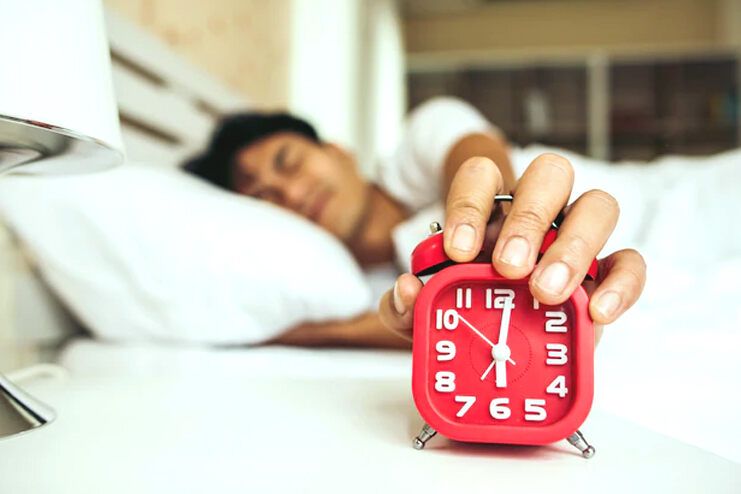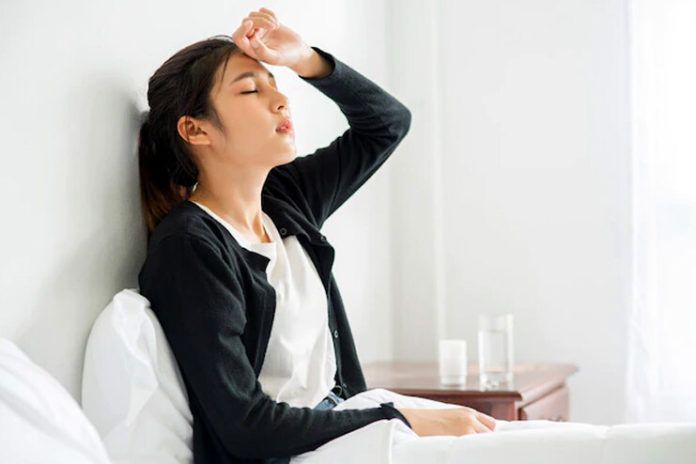Affiliate Disclaimer
Some links in this article are affiliate links. We may earn a small commission if you make a purchase through these links, at no extra cost to you. We only recommend products we find useful to our readersSleep is quite crucial for our well-being, even if you have less or disturbed sleep for a day it can disturb not just your health but also your mental well-being. That is why one needs a proper and adequate amount of sleep every day. It is also true, you might wake up feeling groggy even after having enough sleep. That feeling of grogginess is the worst feeling and it can give you a headache.
When you are sleep-deprived, that is when you get that groggy feeling in the morning. This groggy feeling makes you feel tired and lazy. Even the simplest activity makes you slowly crawl out of your hand. Such agonizing moments can spoil your day or that moment for some time. This phenomenon is known as Sleep Inertia. You may be wondering what is it? Or how can one avoid it? Well need not worry, we are here to answer all your doubts. Just keep reading to find out!
What is Sleep Inertia/ Grogginess?
Feeling groggy is the feeling of being tipsy. This groggy feeling is known as sleep inertia. A person feels disoriented, drowsy, and has a cognitive impairment which is instantly followed once you wake up (R). This period may last for 15 to 60 minutes, for some, it may last for up to a few hours as well after waking up.
There isn’t any biological proof for sleep inertia yet. However, researchers emphasize that sleep inertia is the feeling of unwanted or incomplete wakings due to sudden awakening during the period of REM sleep. REM is a term for rapid eye movement associated with dreaming during one of four stages of sleep. When you are suddenly wake up in the middle of this sleep period, it leads to sleep inertia.
This lethargic feeling in the morning can make you feel groggy and for that, one must set their nighttime routine properly and take measures to avoid feeling this way. Not only does the quantity of sleep matter but also the quality is equally important.
Symptoms
One can notice the symptoms of sleep inertia after waking up and it slowly decreases over time. Sleep inertia symptoms can be present upon waking from a long sleep period or naps over 30 minutes (R).
The most common symptoms of sleep inertia are, a feeling of grogginess, a desire to fall back asleep weakened cognitive ability, reduced visual attention, and impaired conceptual memory.
Reasons you Feel Groggy in the Morning
1. Medications

Medications like over-the-counter sleep meds can leave you feeling groggy soon after you wake up the next morning. Just like alcohol, these medications can make people feel drowsy and even help them fall asleep more easily. Similar to alcohol, they can also disturb your normal sleep cycle and often leave you feeling groggy in the morning.
2. Had alcohol the night before going to bed
If you had a party last night or you are someone who enjoys having a glass of wine or cocktail before going to bed to fall asleep by thinking that it can cause you to have better sleep then you may wake up feeling groggy too. The drink may help you to fall asleep, but it will also mostly lead to a disruption in your sleep cycles.
While you are asleep it will move you from a night of deeper sleep to a lighter sleep during the second half of the night. You may still not feel as well-rested although you may have slept for a good amount of eight hours if compared to someone who had the same amount of sleep without the alcohol the night before going to the bed.
3. Having Caffeine in the afternoon and before bed
Usually one consumes coffee to not feel sleepy. Some people are aware that having coffee just before bedtime can hinder your sleep. Not just during the night but even having caffeine in the evening can disturb your sleep schedule. You may be wondering how can coffee which is consumed in the evening has an effect? Because the issue with caffeine is that it can stay in your body for up to 12 hours after consuming it. So, one must try to avoid coffee or any caffeinated beverages afternoon and before going to the bed.
4. Working out before going to bed

If you are exercising just before going to bedtime, it can sometimes mess with your sleep. Finding time to work out anytime is a great thing and one must be proud of themselves but sometimes certain things just do not work out with your body. Exercising at the night can keep you energized same as you should be winding down for sleep. One may think that doing a workout at night may make them tired before going to sleep, but instead, it keeps you awake at night as your body feels energized and hence contributes to sleep deprivation.
5. Too much light
Is there anyone who likes to sleep in a place that has too much light? No one right? That is why sleeping in the lightness of your room, even if your eyes as closed can affect your body and mind internally. If your bedroom does not have enough darkness enough, it could affect how well-rested you feel the next morning. If there is too much light, it will affect your sleep you will constantly try to avoid the light, or at least your eyes will, so to have a night of better sleep, have a dark atmosphere that feels calm during the night.
6. Having Sleep Apnea
If you feel that everything that you do before bedtime does not disturb your sleep you’re but you still do not feel better in the morning then you may be having sleep apnea. Sleep Apnea is a medical condition in which your airway is repeatedly obstructed by your tongue falling back in your mouth and preventing air from getting into your lungs.
It often leads to snoring and in this period of apnea, your breathing stops, and starts, because of the obstructed airway. The issue is that whenever this happens, it actually pulls you out of deep sleep and brings you into a much lighter form of sleep. Because of this, your sleep cycle can be severely disrupted and it can lead to restlessness, tiredness, and a feeling of sleepiness throughout the day.
7. Long hours of watching TV

If you are someone who loves to watch TV before going to bed for a long duration and end up feeling tired in the morning you may want to reconsider watching before sleeping. You may even fall asleep with the TV or your computer on. Mostly the light from most LCD screens is much more than what we should have and it usually focuses in one direction in our rooms while sleeping. Although it is okay to binge-watch your favorite show, but doing so before bed for a long time with the light can be disruptive and have effects that last into the morning.
Ways To Stop Feeling Groggy
Apps that track your sleep cycle

When you wake up naturally without an alarm, your body does not get disturbed by these natural cycles. Unfortunately, standard alarm clocks do not track your sleep cycle, and will often wake you up just because you have set a default time to every day. Ringing knee-deep in the middle of your deep sleep cycle, which is why the world hates alarm clocks.
Certain apps designed specially to track your sleep cycle can help by attempting to wake you up depending on your sleep pattern, they will usually ask you to set it roughly 15-20 minutes before you fall asleep. There are a few apps that use your phone’s built-in accelerometer to understand and track the stage of your sleep and wake you up they may not always be very accurate all the time but they may definitely give you better progress in your sleep quality.
Yoga or Stretching
Stretching or if you are into yoga helps to reactivate those muscles, they release a ton of endorphins into your system. During the period of your REM sleep, your muscles feel paralyzed and your body feels restless that is the reason why grogginess feels weird and you feel tired even for the simplest of activities.
Reactivating your muscles will make you feel better, your body will feel relaxed, give calming feeling to your mind, and will also improve your health which is definitely a win-win situation. It will benefit it in more than one way.
Washing face with the cold water
Washing your face with cold water revives the nerves present in your face, helping you to wake up. This is an ancient technique, it also helps to depuff your eyes and close your pores, helping your face feel smooth and super refreshed.
All you need to do is splash some cold water on your face two to three times, then pat dry with a clean towel. Or you can also use a bowl of water with ice, then dip your face in gently twice and wipe off. Well, you just need to make sure not to put your face in cold water for over 30 seconds at a time. This might cause your body to start relaxing and make you feel more tired because of the reflex.
Restricting light

Keeping your sleep and waking up a schedule in alignment with the natural cycle and fall of the sun may help to reduce sleep inertia. Studies show that (R) your body’s natural circadian rhythm can be impacted by artificial light and disrupt your sleep causing grogginess. One way is by creating a dark space or by adjusting the light in your bedroom via room darkening curtains may help you get more restful sleep.
Turning your device off before bed
Spending time before bed where your eyes are struggling because of the blue light right from the screen throws your sleeping routine entirely out of whack. Cell phones are literally torture when it comes to your circadian rhythm, your bodies are tuned to use natural light as a circadian trigger.
Try to avoid screens for at least 30 minutes before you go to bed so that your body can relax and adapt to the darkness. In the mornings, (R) introduce more natural light by opening your curtains and windows as our body relies on natural light to have a proper cycle. You can even consider getting a sun lamp if you do not have access to more natural light. Hence, do not disrupt the natural cycle.
Have a glass of water
If you wake up feeling groggy and tired, your body might be just dehydrated. Well to elaborate more, you just spent around seven to eight hours without drinking anything. Not having enough water will make you feel fatigued and moody. Therefore to avoid this, drink at least 12 to 16 ounces of water after you wake up, it will help your body to regain the water loss. After that if possible, you should wait for at least an hour before having caffeine.
Additional Sleep Tips
Finding the right way to sleep is easier said than done. Engaging in a good sleep routine can help you obtain better sleep. Here are some tips that you can for better sleep
- Keep a Consistent Schedule- it is best to set your sleeping schedule fixed, same sleep and wake time, which would be the same even during the weekend or vacations.
- Avoid Alcohol and Smoking- Drinking alcohol in large quantities can increase your risk of heartburn, which can impact your sleep and the ability to comfortably fall asleep. Many people who smoke have been associated with sleeping issues such as trouble falling asleep and low sleep satisfaction
- Pick the Right Bedding- Yes mattress and bedding play an important role. Invest in the best mattress and bedding to feel comfortable at night. A study has reported that people who upgraded their mattress and bedding have experienced less pain and their sleep quality has been improved too(R).
- Diffuse Essential Oils- Diffusing oils are used in aromatherapy for their calming effect. These diffusing oils are usually made from natural substances and have natural scents. Scents like lavender have a calming effect and also promote better sleep
- Avoid Electronics Before Bed- Reduce the time of using devices or binge-watching before going to bed. You can gradually reduce the time and work on it.
- Exercise Daily- It is best to try to avoid exercising right before bed. Although, exercising has been shown to have a positive impact on sleep quality, set your workout routine at the right time for best results and no disturbance in your sleep cycle.
Conclusion
If you experience feeling groggy upon waking up and it tends to wear off quickly, then you do not have to worry much about it. Try the things mentioned above such as having a sleep schedule set, stretching, having enough water after waking up, etc to get rid of the groggy feeling.
If you still have trouble shaking off the grogginess and if it is causing a hindrance to your daily living activities, you may need to talk to your doctor. Hope this post has helped you in understanding more about the topic. Thank you for reading.
Other Related Articles:
In this Article















